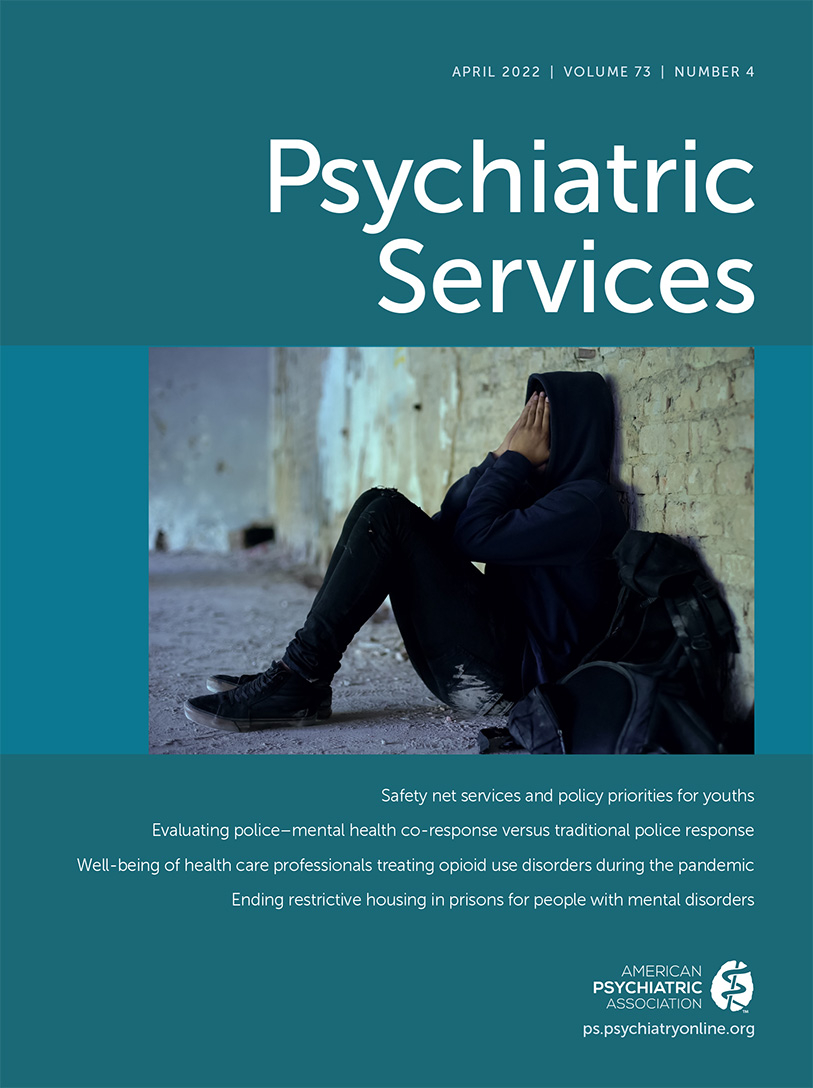Engaging People With Lived Experience in Mental Health Services and Research
This Editor’s Choice collection was published online in March 2022. To review all collections, please visit the Editor’s Choice section of ps.psychiatryonline.org.
Engaging people who have lived experience of mental health conditions and services (including patients, family members, and other stakeholders) can add significant value to research, policy, and program development. Individuals with lived experience have been drivers of change in the mental health system by leading research and programs, partnering with researchers, or consulting during the research process. Advancing the use of peer support programs, advocating for the rights of people with psychiatric disabilities, and creating alternatives to traditional service models (e.g., peer-run respites) are among the contributions that people with lived experience have made to the field. Despite their valuable perspectives and unique understanding of services and systems, individuals with lived experience continue to be excluded from research, policy making, and organizational leadership, more so for individuals with psychiatric disabilities, more deeply stigmatized conditions, and greater experience with public systems.
Community-engaged and community-based participatory methods help to ensure that valuable community perspectives are prioritized in both research and implementation. Communities often know the barriers to care and other challenges facing their members and know how to deploy resources efficiently and effectively to serve the people who need them most. This collection provides an overview of recent research and is a call to action regarding the integration of individuals with lived experience as leaders and in shaping service delivery as well as research design, measurement, and conceptualization.
As the collection editors note, lived experience involvement and leadership are crucial to systems transformation but remain underrepresented and underresourced. As the collection suggests, Psychiatric Services has been publishing a significantly higher volume of work related to lived experience involvement in recent years. Moving forward, we expect the journal’s dedicated lived experience column and new lived experience workgroup to play substantive roles in strengthening and expanding involvement in review as well as authorship. Longer term, we hope that these initiatives will help inspire new norms and standards for mental health and psychiatry research journals in the United States.—Nev Jones, Ph.D., Coeditor, Lived Experience Inclusion & Leadership column
Lived experience
Reconceptualizing Recovery: Integrating Lived Experience Perspectives Into Traditional Eating Disorder Recovery Frameworks
Kenny TE, Lewis SP
Psychiatr Serv 2021; 72:966–968
https://doi.org/10.1176/appi.ps.202000447
Lived Experience, Research, Leadership, and the Transformation of Mental Health Services: Building a Researcher Pipeline
Jones N, Atterbury K, Byrne L, et al.
Psychiatr Serv 2021; 72:591–593
https://doi.org/10.1176/appi.ps.202000468
Putting the “Self” in Self-Injury Research: Inclusion of People With Lived Experience in the Research Process
Lewis SP, Hasking P
Psychiatr Serv 2019; 70:1058–1060
https://doi.org/10.1176/appi.ps.201800488
First-person perspectives
First-Person Accounts of Change Among Young Adults Enrolled in Coordinated Specialty Care for First-Episode Psychosis
Daley TC, Jones N, George P, et al.
Psychiatr Serv 2020; 71:1277–1284
https://doi.org/10.1176/appi.ps.202000101
First-Person Perspectives on Prescriber-Service User Relationships in Community Mental Health Centers
Johnson-Kwochka A, Carpenter-Song E, Griesemer I, et al.
Psychiatr Serv 2017; 68:947–951
https://doi.org/10.1176/appi.ps.201600325
How Occupationally High-Achieving Individuals With a Diagnosis of Schizophrenia Manage Their Symptoms
Cohen AN, Hamilton AB, Saks ER, et al.
Psychiatr Serv 2017; 68:324–329
https://doi.org/10.1176/appi.ps.201600031
Peer-run organizations
Leadership and Characteristics of Nonprofit Mental Health Peer-Run Organizations Nationwide
Ostrow L, Hayes SL
Psychiatr Serv 2015; 66:421–425
https://doi.org/10.1176/appi.ps.201400080
Impact of the 2nd Story Peer Respite Program on Use of Inpatient and Emergency Services
Croft B, İsvan N
Psychiatr Serv 2015; 66:632–637
https://doi.org/10.1176/appi.ps.201400266
Community engagement
Community Engagement Mental Health Model for Home Treatment of Psychosis in Jamaica
Nelson D, Walcott G, Walters C, et al.
Psychiatr Serv 2020; 71:522–524
https://doi.org/10.1176/appi.ps.201900063
A Community-Partnered, Participatory, Cluster-Randomized Study of Depression Care Quality Improvement: Three-Year Outcomes
Ong MK, Jones L, Aoki W, et al.
Psychiatr Serv 2017; 68:1262–1270
https://doi.org/10.1176/appi.ps.201600488
Participation in Training for Depression Care Quality Improvement: A Randomized Trial of Community Engagement or Technical Support
Chung B, Ngo VK, Ong MK, et al.
Psychiatr Serv 2015; 66:831–839
https://doi.org/10.1176/appi.ps.201400099
Community-based participatory research
Implementation of a Community-Partnered Research Suicide-Risk Management Protocol: Case Study From Community Partners in Care
Goodsmith N, Zhang L, Ong MK, et al.
Psychiatr Serv 2021; 72:281–287
https://doi.org/10.1176/appi.ps.202000095
Going to the Source: Creating a Citizenship Outcome Measure by Community-Based Participatory Research Methods
Rowe M, Clayton A, Benedict P, et al.
Psychiatr Serv 2012; 63:445–450
https://doi.org/10.1176/appi.ps.201100272
Evidence-Based Implementation: The Role of Sustained Community-Based Practice and Research Partnerships
Kilbourne AM, Spink Neumann M, Waxmonsky J, et al.
Psychiatr Serv 2012; 63:205–207



